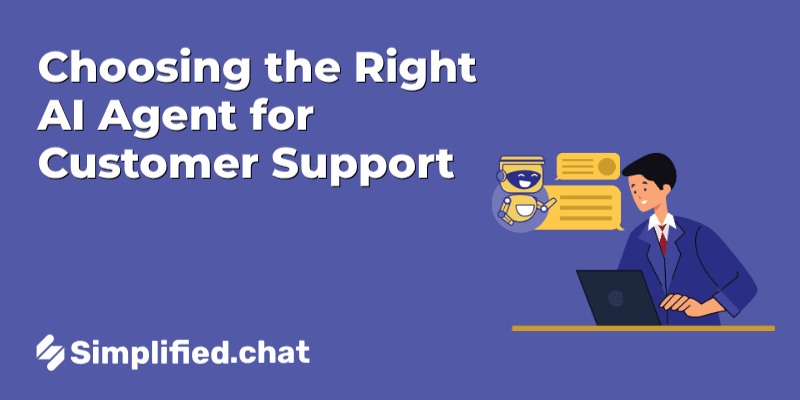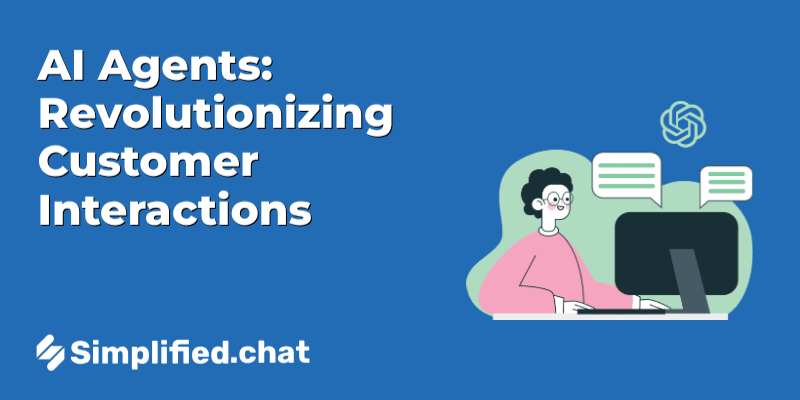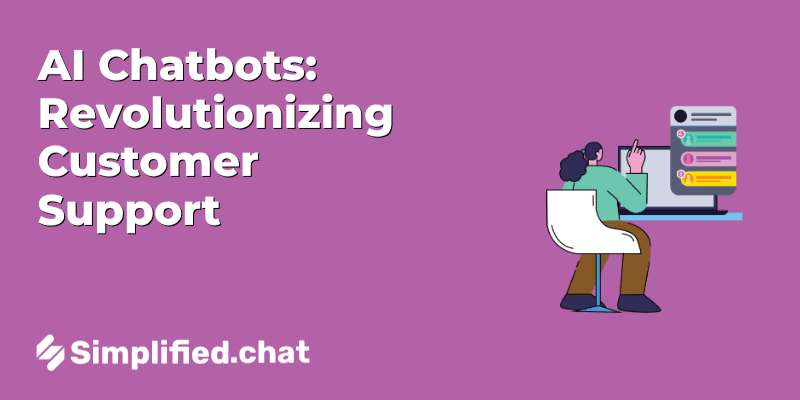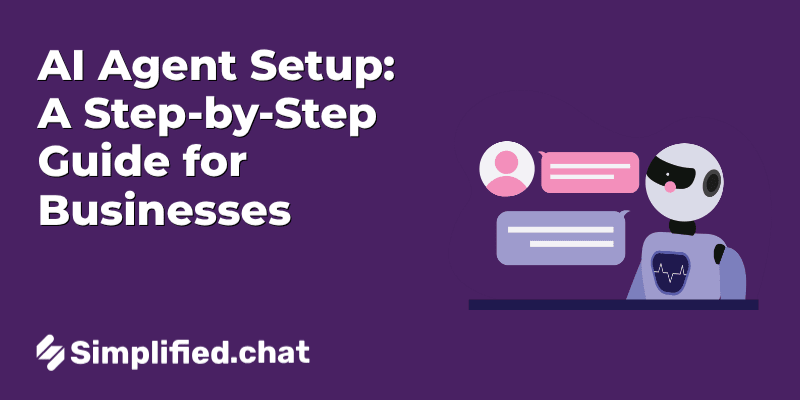Table Of Content
How to Choose the Right AI Agent for Customer Support?
Selecting the appropriate AI agent for customer support can greatly improve how your business interacts with and assists its customers. An AI agent is a sophisticated software system that automates customer service tasks by understanding inquiries, providing pertinent answers, and efficiently resolving issues, ultimately easing the burden on human agents.
An AI agent in customer support is a sophisticated software solution designed to automate and enhance customer interactions. It uses artificial intelligence to understand customer queries, provide relevant answers, and resolve issues efficiently, reducing the workload on human agents.
According to a McKinsey article titled "The future of customer experience: Embracing agentic AI," agentic AI can greatly enhance service operations by increasing productivity and improving customer interactions. The article highlights important factors such as integration abilities, versatility, and customer feedback systems as essential considerations in choosing an AI agent.
Understanding Your Customer Support Needs

Identify Key Support Challenges
Before integrating any new technology into your customer service workflow, it’s essential to clearly understand the existing pain points. This means taking a close look at what’s slowing down or complicating your current support system. Common issues include long response times that frustrate customers, excessively high ticket volumes that overwhelm support staff, or inconsistent answers that reduce trust in your brand.
To get a full picture, consider gathering feedback not only from customers through surveys or direct comments but also from your support team who face these challenges daily. Their insights can reveal bottlenecks that data alone might not show, such as repetitive questions that could be automated or complex issues requiring specialized knowledge.
Define Your Objectives
Once challenges are identified, clarify what you want to achieve by introducing an AI agent into your support strategy. Objectives can vary widely depending on your business model and customer expectations. Some typical goals include:
- Reducing the workload on human agents, allowing them to focus on more complex issues.
- Improving the accuracy and consistency of responses to common inquiries.
- Enhancing overall customer satisfaction by providing faster, 24/7 availability.
- Increasing operational efficiency to handle growth without proportional increases in staff.
Setting measurable objectives upfront helps in selecting the right AI tools and evaluating their effectiveness post-implementation. For instance, if your main goal is to cut response times, you’ll want an AI that can handle initial triaging or simple FAQs instantly.
Assess Current Infrastructure
Understanding the capabilities and limitations of your existing technology is crucial to ensure a smooth integration of AI-powered support. Evaluate factors such as the CRM software you use, your communication channels (live chat, email, social media), and your data management systems.
Compatibility plays a big role here. Deploying an AI agent that doesn’t integrate well may create more problems than it solves, such as fragmented customer records or inconsistent messaging across platforms. Additionally, check for scalability—your chosen solution should support your current volume but also accommodate future growth without major overhauls.
Taking stock of your infrastructure helps in making informed decisions, avoiding costly missteps, and ensuring that your investment in AI truly complements and enhances your existing support framework.
Key Features to Look for in an AI Agent

Choosing the right AI agent goes beyond picking the fanciest technology. It requires a clear eye on what features actually provide value in real-world applications. Careful attention to integration, adaptability, and communication abilities will ensure the AI not only works smoothly but also delivers meaningful interactions with customers. Let’s dive into the essentials that separate a competent AI agent from the rest.
Integration Capabilities
A crucial factor often overlooked is how well the AI agent fits into your existing ecosystem. The agent must integrate seamlessly with your current CRM, messaging platforms, and other business tools. This connectivity enables a unified flow of data, reduces manual handoffs, and avoids silos. For example, if your CRM tracks customer purchases, the AI agent should have access to that information to provide personalized responses or recommendations.
Without solid integration, the AI becomes just another isolated system, limiting its effectiveness and frustrating both employees and customers. Look for AI solutions that support APIs or built-in connectors for popular software. This investment upfront saves time and effort later, ensuring your AI agent operates within the context of your broader operations.
Versatility and Adaptability
Customer interactions rarely follow a single script. An effective AI agent must handle a variety of queries—from simple FAQs to complex troubleshooting—while adapting to different communication styles. This capability means it can serve diverse customer profiles, whether someone prefers formal language or a casual tone.
Versatility also includes the ability to escalate issues when necessary and learn from interactions to improve over time. Systems with machine learning components can adjust responses based on feedback and evolving user behavior, making them more useful in the long run. When evaluating AI agents, consider how they perform across multiple scenarios and whether they offer customization options to align with your brand voice and policies.
Natural Language Processing (NLP)
At the heart of any strong AI agent is its natural language processing (NLP) capability. Advanced NLP allows the AI to truly understand what customers are asking—not just respond to keywords. It interprets context, sentiment, and intent, which leads to more accurate and relevant replies.
Beyond simple pattern matching, NLP-powered agents can handle ambiguous phrasing or variations in dialect, improving customer satisfaction. Studies show that customers are more likely to engage positively when the AI demonstrates comprehension akin to a human agent. Therefore, prioritize AI agents equipped with advanced NLP models, which continually improve through ongoing training and data enrichment.
Evaluating Integration and Compatibility for Your AI Agent

When selecting an AI agent, ensuring smooth integration and compatibility with your existing systems and platforms is critical. Without it, even the most sophisticated AI tools may cause friction rather than streamline operations. Let’s explore key factors to consider during this evaluation.
API and SDK Availability
One of the most practical ways to guarantee seamless connectivity is by verifying the AI agent offers robust APIs (Application Programming Interfaces) and SDKs (Software Development Kits). These tools act as bridges, allowing your current software and workflows to communicate effectively with the AI system.
Look for platforms that provide:
- Comprehensive documentation, making it easier for your developers to implement and maintain integrations
- Support for multiple programming languages or frameworks aligned with your tech stack
- Stable and well-maintained endpoints to reduce downtime or disruptions
APIs and SDKs not only simplify integration but also give you flexibility to automate tasks or extend functionality as needed, which can significantly reduce manual workload in the long run.
Platform Compatibility
Consider the messaging platforms most relevant to your customers, whether that be WhatsApp, Facebook Messenger, or others. The AI agent should support these platforms or at least offer reliable connectors.
Evaluate the following aspects:
- Does the AI agent have official partnerships or verified integrations with these platforms? This often ensures better stability and compliance.
- How well does the AI handle platform-specific features like multimedia messages, read receipts, or typing indicators?
- Is the user experience consistent across channels to avoid confusing customers?
Ensuring platform compatibility maximizes your ability to engage customers where they already spend their time, without forcing them to switch to less familiar channels.
Customization Options
Your AI agent won’t deliver its full value if it feels generic or out of sync with your business identity and workflows. Confirm that the solution allows for meaningful customization, such as:
- Adapting conversational scripts to match your brand’s tone and personality
- Configuring workflows to reflect your unique business processes without extensive coding
- Modifying response triggers, fallback options, and escalation pathways according to your support model
Customization also means you can maintain control over the customer experience, ensuring interactions feel natural and relevant rather than scripted or robotic. This can have a direct impact on how customers perceive your brand.
In summary, a thorough review of API availability, platform compatibility, and customization capabilities is essential before committing to an AI agent. These elements determine not only how easily the AI fits into your current ecosystem but also its long-term effectiveness in meeting your business needs.
The Importance of Customer Feedback Mechanisms

Incorporating customer feedback is vital for refining AI agents and ensuring they meet user expectations effectively. Without structured feedback mechanisms, it’s challenging to understand how customers perceive interactions and where improvements are necessary. Genuine customer insights serve as a guide to tailor AI behavior, making it more intuitive, helpful, and aligned with user needs.
Feedback Collection Methods
Collecting feedback should be integrated seamlessly into the AI interaction process to encourage participation without disruption. Some practical methods include:
- Short post-interaction surveys that ask users to rate their experience or specify issues.
- Real-time feedback options like thumbs up/down or emoji reactions directly after AI responses.
- Open-ended input fields where users can describe any inconvenience or suggestions.
- Periodic follow-up emails or notifications requesting detailed feedback on overall AI performance.
Ensuring these methods are easy to access and quick to complete increases the likelihood of collecting meaningful data.
Analyzing Feedback Data
Gathered feedback is only useful when carefully analyzed. Effective analysis identifies patterns and highlights critical pain points or successful AI behaviors. Techniques to approach this include:
- Quantitative analysis of ratings or scores to track trends over time.
- Text analysis of open-ended responses to spot recurring themes or specific issues.
- Segmenting feedback based on customer demographics or usage contexts to understand diverse needs.
By systematically interpreting feedback, teams can pinpoint exactly where the AI agent falls short or excels, providing a clear roadmap for enhancements.
Iterative Improvement
Customer feedback should fuel an ongoing cycle of refinement rather than be a one-time check. The best AI agents evolve through consistent updates guided by direct user input. This iterative process involves:
- Prioritizing improvements that have the greatest positive impact on user satisfaction.
- Testing modifications in controlled environments before wider deployment.
- Reassessing feedback post-implementation to verify that changes addressed the issues effectively.
Continuously adapting to customer needs builds trust and drives better engagement, ultimately enhancing the overall user experience.
Effective Implementation and Training of Your AI Agent

Pilot Testing
Before fully launching an AI agent, starting with a pilot test is crucial. This phase allows you to see how the AI performs in a real-world environment, with actual customer interactions and unpredictable scenarios. The pilot helps identify gaps in the AI’s understanding or response quality early on. It’s a practical way to validate assumptions about the AI’s capabilities and to gather feedback from end users or team members. A well-planned pilot ensures that the AI integrates smoothly into existing workflows and meets the intended objectives without causing disruption.
Training the AI Agent
Comprehensive training is the foundation for an AI agent that can effectively handle a diverse range of customer queries. This involves feeding the AI a broad and well-curated dataset representing various customer intents, phrasings, and contexts. The goal is to prepare the AI to understand nuances and edge cases rather than just straightforward questions. Training datasets should be continuously updated to reflect changes in customer behavior, product lines, or services. As studies in machine learning emphasize, quality and diversity in training data have a direct impact on the AI’s accuracy and reliability in real interactions.
Monitoring and Optimization
Once deployed, an AI agent isn’t set-and-forget. Continuous monitoring is essential to maintain and improve its performance. Tracking metrics like response accuracy, customer satisfaction scores, and fallback rates provides insights into where the AI might be struggling. Regularly reviewing these performance indicators allows for targeted optimization—adjusting the AI’s algorithms, updating training data, or refining knowledge bases. Incremental improvements based on real usage ensure the AI adapts over time and becomes increasingly capable at providing relevant and timely support.
Choosing the Best AI Agent for Enhanced Customer Support Experience
Choosing the right AI agent for customer support requires a thorough understanding of your unique needs, the key features that will add value, and compatibility with your current systems. It is equally important to establish reliable customer feedback processes to keep improving the AI agent’s performance. By following these steps, you ensure that your AI agent effectively contributes to better customer interactions and operational improvements.
With Simplified.chat, you can create personalized AI chatbots that work well with messaging channels such as WhatsApp and Facebook Messenger, helping you automate support interactions and strengthen customer relationships. Begin your journey towards streamlined customer support today with Simplified.chat and experience the advantages of AI-powered communication.
Empower Your Business with Simplified AI Chatbot
Build Your Own AI ChatbotBuild Your First AI Agent Today
Build, train, customize and deploy your first AI chatbot in minutes




